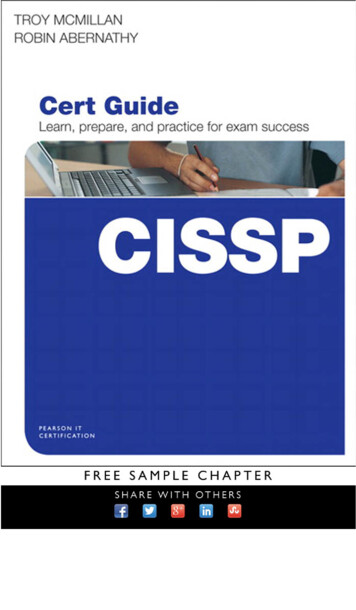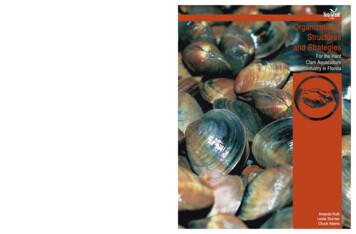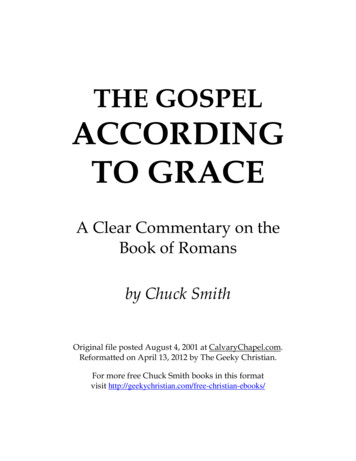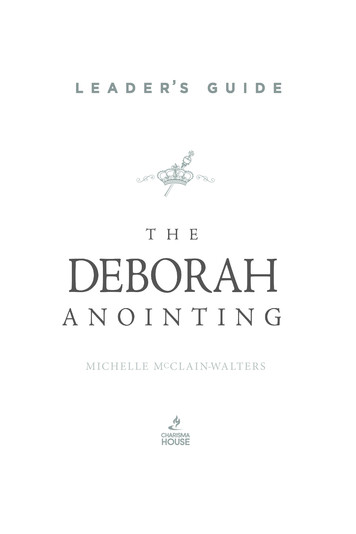
Transcription
CHARISMAVS.CHARISMANIAby Chuck SmithOriginal file posted August 4, 2001 at CalvaryChapel.com.Reformatted on April 13, 2012 by The Geeky Christian.For more free Chuck Smith books in this formatvisit http://geekychristian.com/free-christian-ebooks/
Table of Contents1. Searching for the Answer2. The Holy Spirit Is God3. The Person of the Holy Spirit4. The Work of the Spirit in the Life of the Believer5. The Agape Love of God6. The Word of God Becomes Real7. The Work of the Holy Spirit in the World8. Something More9. Speaking in Tongues10. When Are Tongues to Cease?11. Why Charisma Often Becomes Charismania12. Receiving the Power13. A More Excellent Way14. A Final Word2 Page
1. Searching for the AnswerI spent much of my childhood and adolescent yearstrying to prove I was normal even though I didn't go tomovies or dances. In the Pentecostal church I attended,movies and dancing were considered horrible sins.Since I couldn't join my friends in their worldlyactivities, I asked them to attend church with me, forwe were constantly being exhorted to witness for Christby bringing friends to church. The problem was thatalmost every Sunday the pastor would warn of theevils of Hollywood, dancing, drinking, and smoking.He used to say, "If God wanted man to smoke, Hewould have put a chimney on top of his head." Besidesthis, the service was always interrupted by two or three"messages in tongues" and interpretations.Many times as I was seated with my unsaved friendsthat I had brought to church, Mrs. Newman would startbreathing funny. I had learned that this was the preludeto her speaking in tongues, so I would quickly pray,"Oh, God, please don't speak in tongues today; myfriends won't understand." Either God wasn't hearingme or Mrs. Newman wasn't listening to God, becauseshe would stand up, shaking all over, and deliver God'smessage for the day in a loud, high-pitched voice. I3 Page
would die inside as my friends giggled beside me. Ihoped they weren't committing the unpardonable sin.I was always tense after the service as I waited for myfriends to ask the inevitable question, "What was that?"I had a hard time explaining it because I didn't fullyunderstand it myself.As a child I couldn't help but wonder about these"messages in tongues" that I heard. Sometimes a shortmessage was followed by a long interpretation or else along message was followed by a short interpretation.At other times I would notice repeated phrases in themessage in tongues and wonder why there weren'tcorrespondingly repeated phrases in theinterpretations.The Mounting QuestionsThere were other things that bothered me about thechurch I attended. I wondered why, if we were themost spiritual church in town and had the most power,the other churches had so many more members. I wastold that most people were looking for an easy way toheaven, and that the other churches were largerbecause they told the people what they wanted to hear.If our church did that, it would be full too - of peoplebound for hell.Another problem I had with our church was its lack oflove. I knew that the fruit of the Spirit is love, so Icouldn't understand why there were so many churchsplits. It seemed that there were always some memberswho wanted to get rid of the pastor and others who4 Page
supported him. People left our church so often that, ifall the former members of the church returned, wewould have had the largest church in town!Somehow, leaving our church was tantamount toleaving the Lord. Those who had left had surelybackslidden in their search for an easier way to heaven.However, I often found myself wishing I could go tothe Community Church or the Presbyterian Church.Then on Sunday night I would feel convicted for mydesire to "backslide," and I would go forward to thealtar and get "saved" again.I tried to prove that I was normal by excelling in school.I worked to be the smartest kid in the class, the fastestrunner in the school, and the one who could hit the ballfarther than anyone else. Unfortunately, most of theother kids in my Sunday school class tried to provethey were normal by smoking, drinking, and runningaround with the tough gangs at school. Very few ofthem remained in Sunday school past junior high.Through the grace of God, and with deeply committedparents, I somehow survived.The Results of My QuestAs strange as it may seem, I am convinced today thatthe dead orthodoxy of many churches could beenhanced by the gifts of the Holy Spirit in operationwithin the body. Not the unscriptural excesses Iobserved as a child, but the gifts exercised in a solid,Scriptural way, with the Word of God as the finalauthority guiding our faith and practice.5 Page
With this in mind, I began a search of the Scriptures fora sound, balanced approach to the Holy Spirit and Hiswork in the church today. There must be a middleposition between the Pentecostals, with theiroveremphasis on experience, and the fundamentalists,who, in their quest to be right, in too many cases havebecome dead right. The results of my quest arerecorded in part in this book, which I pray that Godmight use to lead you into the fullness of the Spiritfilled life.Charisma is a beautiful, natural anointing of God'sSpirit upon a person's life, enabling him or her to do thework of God. It is that special dynamic of God's Spiritby which a person seems to radiate God's glory andlove.Charismania is an endeavor in the flesh to simulatecharisma. It is any effort to do the work of the Spirit inthe energies or abilities of the flesh - the old, selfishnature of a person. It is a spiritual hype that substitutesperspiration for inspiration. It is the use of the genius,energy and gimmicks of man as a substitute for thewisdom and ability of God. It can be demonstrated insuch widely divergent forms as planning and strategysessions, devising programs for church growth, raisingfunds for the church budget, or wild and disorderlyoutbursts in tongues that disrupt the Sunday-morningmessage. Whatever lacks a sound Biblical basis anddemonstrates a lack of trust in the Holy Spirit toaccomplish His purposes in the church apart from thedevices and abilities of man is the work of the flesh.6 Page
The Balanced PositionThis book will seek to present a Scripturally balancedposition between the detractors who say, "The devilmakes them do it" and the fanatics who say, "The HolySpirit made me do it." It will also show who the HolySpirit is and will describe His proper work in theworld, the church, and the life of the believer.We do not ask you to blindly accept all the premises,but we encourage you to search the Scriptures to see ifthese things are so. "Prove all things; hold fast thatwhich is good" (I Thessalonians 5:21).7 Page
2. The Holy Spirit is GodSince the purpose of this book is to bring you into a full,personal, and soundly Biblical relationship with Godthe Holy Spirit, we need to first show that the HolySpirit is one of the three Persons of the I Godhead.The church has accepted throughout its history thatthere is one God who exists in three Persons: the Father,the Son, and the Holy Spirit. In the Scriptures we findThem working together in total harmony for theredemption of man. Paul confessed to Timothy that theGodhead was a great mystery; for us to try to fullycomprehend it is a futile expenditure of mental energy.Many cult groups (such as Jehovah's Witnesses) takeadvantage of this gulf between the finite and theinfinite to attack the triunity of God by denying thedeity of Jesus Christ and passing off the Holy Spirit asan essence. Other groups deny the existence of theFather and the Holy Spirit, and say that Jesus alone isGod. One of the common marks of every cult is a denialof the deity of Jesus Christ and the Person of the HolySpirit.The Triune GodBecause this is one of the areas that the enemyconstantly attacks, we must affirm not only the fact of8 Page
the deity of the Holy Spirit, but also why we believe inHis deity. The word "trinity" is not found in the Bible,but it is a convenient term that theologians use todescribe the three Persons of the one God. Perhaps theterm triunity would more accurately describe God. Heis not 1 1 1 3, but 1 x 1 x 1 1.In Genesis 1:1 we read, "In the beginning God" TheHebrew word translated "God" is Elohim, which isplural for El (God in the singular). In Hebrew there is ax singular, dual, and plural tense. "God" in the singularis El, in the dual is Elah, and in the plural is Elohim.There can be no denying that the word "Elohim" at leastsuggests the triunity of God.Continuing in Genesis 1:2 we read, "the Spirit of Godmoved upon the face of the waters." The Holy Spirit isthe first Person of the Godhead to be identifiedseparately in the Bible. In Genesis 1:26 we read, "AndElohim said, Let us make man in our image, after ourlikeness." He did not say, "I will make man after myimage." In other words, the three Persons of theGodhead were speaking jointly.The Attributes of the Holy SpiritTo establish that the Holy Spirit is God, we will firstshow that attributes which can be ascribed to Godalone are ascribed to the Holy Spirit. One of the divineattributes is the eternal nature of God. He has alwaysexisted. In Hebrews 9:14 we read that Christ throughthe eternal Spirit offered Himself without spot to God.If the Spirit is eternal, and this is an attribute that canonly be ascribed to deity, then the Spirit is God. Notice9 Page
also how the three Persons of the Trinity are linked inthe verse.Another attribute of God is His omniscience. Godknows all things, as James said in Acts 15:18: "Knownunto God are all His works from the beginning of theworld." This attribute is also ascribed to the Holy Spirit.In I Corinthians 2:10,11 we read, "But God hathrevealed them unto us by His Spirit. For the Spiritsearcheth all things, yea, the deep things of God. Forwhat man knoweth the things of a man save the spiritof man which is in him? Even so the things of Godknoweth no man, but the Spirit of God." Here theknowledge of God is attributed to the Spirit of God.Another attribute of deity is omnipresence. God existseverywhere in the universe at once. In Psalm 139:7David asks, "Whither shall I go from Thy Spirit? Orwhither shall I flee from Thy presence?" God exists inthe heavens, in hell, and in the uttermost parts of thesea. The Spirit is with me now where I am, and at thesame time He is with you wherever you may bereading this book right now. God is omnipotent. This isa word used to express that He is all-powerful. WhenSarah laughed at the announcement that she was tohave a son in her old age, the angel of the Lord asked,"Is anything too hard for the Lord?" (Genesis 18:14).Jesus said, "With God all things are possible" (Mark10:27). In Luke 1:37 He said, "With God nothing shall beimpossible." The angel said to Mary when shequestioned him on how she, a virgin, could bear achild, "The Holy Spirit shall come upon thee and thepower of the Highest shall overshadow thee" (Luke10 P a g e
1:35). Here the Holy Spirit and the power of the highestare used synonymously.The Works of the SpiritNot only are divine attributes ascribed to the HolySpirit, but so are divine works. One of the divine worksis that of creation. The entire Trinity was active increation. In Genesis 1:1 we read, "In the beginningElohim created the heavens and the earth." In John 1:1-3we read, "In the beginning was the Word, and theWord was with God, and the Word was God. All thingswere made by Him, and without Him was not anythingmade that was made." The Spirit was also an activeforce in creation. In Genesis 1:2 the Spirit is described asmoving over the face of the waters. The Spirit was inconference with the Father and the Son when God said,"Let us make man in our likeness" (Genesis 1:26). InPsalm 104:30 we read, "Thou sendest forth Thy Spirit,they are created."Another work of God is that of giving life. Werecognize that God is the Giver and Sustainer of life. InII Corinthians 3:6, as Paul was referring to the letter ofthe law, he said, "The letter killeth, but the Spirit givethlife." In John 6:63 Jesus said, "It is the Spirit that[maketh alive]."The Bible was written by the inspiration of the HolySpirit, yet we properly refer to the Bible as the Word ofGod. Second Peter 1:21 tells us, "For the prophecy camenot in old time by the will of man, but holy men of Godspoke as they were moved by the Holy Spirit." In IITimothy 3:16 Paul declares, "All Scripture is given by11 P a g e
inspiration of God." Peter says that the writers weremoved by the Holy Spirit and Paul says that they wereinspired by God. Thus the Spirit is recognized to beGod.This is why many Scriptures in the Old Testamentwhich declare that the Lord spoke are attributed to theHoly Spirit when quoted in the New Testament. InIsaiah 6:8,9 the prophet said, "I heard the voice of theLord, saying, Whom shall I send, and who will go forus? Then said I, 'Here am I; send me.' And He said, Go,and tell this people, ye hear indeed but understand not;ye see indeed but perceive not." When Paul quoted thispassage in Acts 28:25,26 he said, "Well spoke the HolySpirit by Isaiah the prophet unto our fathers, saying,'hearing ye shall hear and not understand; seeing yeshall see and not perceive.'" Isaiah said the Lord spoke;Paul said the Holy Spirit spoke. They can both be rightonly if the Holy Spirit and the Lord are one.The Trinity Working TogetherIn Acts 5:1-11 we have an interesting account ofdiscipline in the infant church as God was seeking topreserve its purity. Motivated by love, many Christiansattempted to establish a Christian community byselling all their possessions and turning the proceedsover to the apostles, so that the Christians might haveall things in common. A certain couple, Ananias andSapphira, sold their property but together decided tohold back a share of the price for themselves. WhenAnanias brought his portion to Peter, Peter asked,"Why has Satan filled your heart to lie to the Holy12 P a g e
Spirit, and to keep part of the price of the land? While itremained was it not your own? And after it was sold,was it not in your own power? Why have youconceived this thing in your heart? You have not lied tomen, but to God" (Acts 5:3,4). Peter said that Satan hadfilled the heart of Ananias to lie to the Holy Spirit, thendeclared that he had lied to God, thereby making theHoly Spirit and God one.Throughout the New Testament we see the Trinityworking together or coupled together. When Jesuscommissioned the disciples to go out and teach allnations (Matthew 28:19,20), He told them to baptizeinto the name of the Father, and of the Son, and of theHoly Spirit. These three names distinguish the threePersons of the one God.In II Corinthians 13:14, in his apostolic benediction,Paul said, "The grace of the Lord Jesus Christ, and thelove of God, and the communion of the Holy Spirit bewith you all. Amen." Here again the three Persons ofthe one God are linked together.In I Corinthians 12:4-6 Paul says, "Now there arediversities of gifts, but the same Spirit. And there aredifferences of administrations, but the same Lord. Andthere are diversities of operations, but it is the sameGod who works all in all." In verse 4 he refers to theSpirit, in verse 5 to the Lord (Jesus), and in verse 6 toGod (the Father). So, though there may be diversities inthe gifts and in their operation and administration,there is a unity because God is behind it all.Access Through the Spirit13 P a g e
At this point you may be thinking, "Well, whatdifference does it all make whether the Spirit is God orjust an essence from God?" Because the Spirit is a partof the Godhead, it is proper to worship Him, and weare correct when we sing, "Praise Father, Son, and HolyGhost." God has ordained that we relate to Himthrough the Spirit. It is in the realm of the Spirit thatman can touch God. It is my spirit brought into unionwith the Holy Spirit. Jesus said, "God is a Spirit, andthey that worship Him must worship Him in Spirit andin truth" (John 4:24). Paul also said, "His Spirit bearswitness with our spirits" (Romans 8:16). If I am to havecommunion with God, I must recognize the Holy Spiritand realize that He is the One that makes thisfellowship possible.Man has never had direct access to the Father; this is acommon fallacy among people who forget the awesomeholiness of God. When God manifested Himself on theHoly Mount to the Jewish people (Exodus 19), He hadthem set boundaries around the mountain so theywouldn't get too close to the manifestation of God andbe put to death. When the people saw from afar theawesome demonstration of God, they said to Moses,"You speak to us and we will hear, but don't let Godspeak to us lest we die."The veil in the tabernacle demonstrated the separationthat must exist between the Holy God and an unholypeople. This veil could only be penetrated after anelaborate cleansing and sacrifices by the high priest,and this only one day in the year, and by the one man,the high priest.14 P a g e
Jesus said, "No man comes to the Father but by me"(John 14:6). Jesus told the Jews that they really didn'tknow the Father. He also told them that Moses wouldbe the witness against them. They do not follow theprescribed way to God that was given to Moses byGod, but today seek to approach Him on the basis oftheir good works without sacrifice. Sin has always beenthe barrier between man and God, and until somethingis done about man's sin, there can be no approach toGod. In Isaiah 59:1,2 we read, "Behold, the Lord's handis not shortened that it cannot save; neither His earheavy that it cannot hear; but your inequities haveseparated between you and your God, and your sinshave hid His face from you, that He will not hear."Jesus provided a way to cleanse us from our sins, thusmaking the approach to God possible. Through faith inJesus Christ my spirit is made alive, and thus can beunited with God's Spirit. In this way God and man arejoined in the Spirit.15 P a g e
3. The Person of the Holy SpiritBecause we want you to have a personal encounterwith the Holy Spirit, we will next show that theScriptures teach that the Holy Spirit is a Person, ratherthan merely an essence, force, or power. You can haveraw power without personality, such as electricity, butit is difficult to have an intimate, close relationship tosuch impersonal power.The word "spirit" in Greek is pneuma, which is in theneuter gender. Because of this, in early church history abrilliant theologian named Arius began to promote theidea that Jesus was less than God, having been createdby God, and that the Holy Spirit is just the "essence" ofGod. This became known as the Arian heresy, and itstill exists and attracts a wide following. The NicaeanCounsel stripped Arius from his position and brandedhis teachings as heresy. The Holy Spirit is more thanjust an essence or force; He is a Person. You shouldn'tworship a force or essence. Can you imagine singingthe doxology, "Praise Father, Son, and Essence"? He is aPerson, and as one of the Persons of the Godhead He isworthy to be praised. If we do not believe in thepersonality of the Holy Spirit, we deny Him the praiseand worship due Him. If we do not realize that theHoly Spirit is a Person, we find ourselves in theposition of seeking to relate to a force or essence. We16 P a g e
would be saying, "I need to yield my life to it," or, "Ineed more of it in my life."Knowing, Acting, FeelingThat He is a Person is clearly shown in the Scriptures.Characteristics are ascribed to Him that can only beascribed to persons. A person is a being with a mind,will, and feelings. If in the Scriptures thesecharacteristics are ascribed to the Holy Spirit, then itmust be concluded that the Spirit is a Person. In ICorinthians 2:10,11 we read, "But God hath revealedthem unto us by His Spirit, for the Spirit searcheth allthings, yea, the deep things of God. For what manknoweth the things of a man save the spirit of manwhich is in him? Even so the things of God knoweth noman, but the Spirit of God." Here reference is made tothe Spirit possessing knowledge. Raw force or powerpossesses no knowledge. It would be absurd to replacethe word "essence" for "Spirit" in the text, for youwould have the "essence" searching all things!In Romans 8:27 Paul says, "And He that searcheth thehearts knoweth what is the mind of the Spirit becauseHe maketh intercession for the saints according to thewill of God." Here reference is made to the mind of theSpirit, a characteristic not associated with just anessence. In I Corinthians 12:11 Paul, concerning thegifts of the Spirit, says, "But all these worketh that oneand selfsame Spirit, dividing to each man severally asHe wills." So the Holy Spirit possesses a will, a traitassociated with personality.17 P a g e
In Romans 15:30 Paul associates the emotion of love tothe Spirit. A force or power cannot love. You do notassociate love apart from personality. It is interestingthat, although I have read or heard scores of sermonson God's love, or the love of Jesus Christ for us, I haveyet to hear a sermon on the love of the Holy Spirit. Yetthis must be one of the chief characteristics of the Spirit,as this is the fruit He produces in our lives. The HolySpirit does possess feelings and can be grieved, becausePaul in Ephesians 4:30 admonishes the church not togrieve the Holy Spirit of God. Think how foolish itwould sound to say you have grieved the essence.The Personal WordsThroughout the Scriptures personal pronouns are usedto refer to the Holy Spirit. In John 14:16 Jesus said,"And I will pray the Father, and He shall give youanother Comforter, that He may abide with youforever." Here the pronoun "He" is used for both theFather and the Spirit. If you believe in a personal God,you should also believe in a personal Spirit. In thatsame passage Jesus went on to say that the world couldnot receive the Spirit because they did not see Him orknow Him; Jesus said that you know Him, for Hedwells with you.Notice how many times Jesus uses the personalpronoun for the Holy Spirit. In John 16:7-14 Jesusrepeatedly uses the personal pronoun to refer to theHoly Spirit. "Nevertheless, I tell you the truth: It isexpedient for you that I go away, for if I go not away,the Comforter will not come unto you; but if I depart I18 P a g e
will send Him unto you. And when He is come, He willreprove the world of sin, and of righteousness, and ofjudgment: of sin, because they believe not on me; ofrighteousness, because I go to my Father, and ye see meno more; of judgment, because the prince of this worldis judged. I have yet many things to say unto you, butye cannot bear them now. Howbeit when He, the Spiritof truth, is come, He will guide you into all truth: forHe shall not speak of Himself; but whatsoever He shallhear, that shall He speak: and He will show you thingsto come. He shall glorify me: for He shall receive ofmine, and shall show it unto you. All things that theFather hath are mine: therefore said I, that He shall takeof mine, and shall show it unto you." In the Greek, thepersonal pronouns "He" and "Him" are used for theSpirit over and over in Scripture.The Spirit in ActionPersonal acts are ascribed to the Holy Spirit in theScriptures. In Acts 13:2 we read, "The Holy Spirit said,Separate me Barnabas and Saul for the work whereuntoI have called them." Again, to insert "power" or"essence" for the Spirit is incomprehensible. How canan essence or power speak? In Romans 8:26 we are toldthat the Holy Spirit Himself makes intercession for uswith groanings which cannot be uttered. Again, try toconceive a mere force making intercession! If the HolySpirit were just an essence or force where He ismentioned in Scripture, you should be able to insert thewords "force" or "essence" and do no damage to themeaning of the text. But such a thing is obviouslyimpossible, because the Holy Spirit is a Person. The19 P a g e
Holy Spirit testifies of Jesus Christ in John 15:26, andHe teaches the believers and brings things to theirremembrance in John 14:26. In Acts 16:2,7 the HolySpirit forbade Paul and his companions to go into Asiaand would not allow them to go into Bithynia. InGenesis 6:3 we find that the Holy Spirit strives withman.The Holy Spirit can receive treatment as a Person. Hecan be offended. It is impossible to conceive ofoffending "the power" or "the breath." Your breath canbe offensive, but you can't offend your breath! InEphesians 4:30 Paul exhorts, "Grieve not the Holy Spiritof God." The Holy Spirit can be lied to. This is theaccusation that Peter brought against Ananias: "Youhave lied to the Holy Spirit." It is also possible toblaspheme the Holy Spirit. Jesus said that this was sucha heinous sin that there was no forgiveness for theperson who did it. He said, "You can blaspheme meand be forgiven, but not the Holy Spirit." Here Jesusmakes the distinct separation between Himself and theHoly Spirit.The Holy Spirit is identified with persons. Paul said, "Itseemed good to the Holy Spirit and to us" (Acts 15:28).Try making sense by inserting wind or power in thisverse!The Holy Spirit is a Person; He is not just the essence ofGod. You need to come into a personal relationshipwith Him so that you might begin to experience Hislove and His power working in your life as He guidesyou in your spiritual walk.20 P a g e
The Power of the SpiritHave you ever felt that you should share with a personhis or her need to accept Jesus Christ, yet you didn'thave the nerve to bring up the subject? Have you evergone past a college, observed the thousands ofstudents, realized that most of them are lost, and thenwondered how they could possibly be reached forChrist? Do you ever think of the billions of people whohave never received a true presentation of the gospel,and then wonder how it might be accomplished?To Peter, who denied his Lord on a one-to-one basiswith the young maid, and to the rest of the disciples(who fled when the going got tough) the commission ofJesus to go into all the world and preach the gospel toevery creature must have seemed a totally impracticalas well as an impossible command, and indeed it was.There is no way that 11 insignificant men from Galileecould reach the world for Jesus Christ. That is whyJesus told them to wait in Jerusalem until they receivedthe power of the Holy Spirit, for it was by this powerthat they were to be witnesses to the uttermost parts ofthe world.Is this experience of the power of the Holy Spiritsomething that God intended only for the early church?Do the Scriptures indicate that the time would comewhen we did not need to depend on the power of theSpirit, but through our perfected knowledge of theScriptures we could do God's work on our own? Is thechurch that was begun in the Spirit now to be perfectedin the flesh? What is the answer to the church's21 P a g e
impotence? Why has the church failed to stop the maddownward plunge of the corrupted world around us?Paul warns us in Hebrews 4 to fear that we do not comeshort of receiving the promise of God to enter into Hisrest. Is it not also appropriate for us to fear that, if Godhas given us a promise of power in our personal livesand power in the corporate body of the church, wemight come short of it?The Promise of the FatherIn Acts 1 we read that the disciples were with Jesus inBethany, from where He would soon be departing fromthem and ascending into heaven. The clouds wouldreceive Him out of their sight. He was giving to themtheir final instructions, which were of the utmostimportance. In Acts 1:4 Jesus told them not to departfrom Jerusalem, but to wait for the promise of theFather, which, He said, "You have heard of me." InLuke 24:49 Jesus said, "And, behold, I send the promiseof my Father upon you; but tarry ye in the city ofJerusalem until ye be endued with power from onhigh."In both places Jesus referred to the promise of theFather, which is no doubt a reference to Joel 2:28,29,where God promised, "And it shall come to passafterward that I will pour out my Spirit upon all flesh,and your sons and daughters shall prophesy, your oldmen shall dream dreams, your young men shall seevisions; and also upon the servants and upon thehandmaids in those days will I pour out my Spirit."This is confirmed in the second chapter of Acts, when22 P a g e
the crowd that had assembled as a result of thesupernatural phenomena accompanying theoutpouring of the Holy Spirit was asking the question,"What does this mean?" Peter in explanation replied,"This is that which was spoken of by the prophet Joel,"and he quoted the prophecy of Joel. The promise ofGod was that the day would come when He wouldpour out His Spirit, not just upon special individuals,but upon all flesh.The Promise of the SaviorJesus had also promised the Spirit to His disciples inJohn 14:16,17, where He said, "And I will pray theFather, and He shall give you another Comforter, thatHe may abide with you forever, even the Spirit of truth,whom the world cannot receive because it seeth Himnot neither knoweth Him; but ye know Him, for Hedwells with you and shall be in you." When Jesuspromised the Holy Spirit, He referred to Him as"another Comforter." The wordtranslated comforter comes from the Greekword parakletos, which literally means "to comealongside to help." This is the basic ministry of the HolySpirit to the believer. He is there to help us. Up to thistime Jesus had been alongside His disciples, helpingthem. They had rightly come to depend upon His help.He was the Master of every situation.When the storm threatened to sink their little boat,Jesus rebuked the winds and the waves, and there wasa great calm. When the tax collector was demandingunjust taxes, Jesus told Peter to go down and catch a23 P a g e
fish and take the coin out of its mouth and pay thetaxes. No matter what situation arose, Jesus was alwaysalongside to help.Now He has told them that He is leaving them. H
Charisma is a beautiful, natural anointing of God's Spirit upon a person's life, enabling him or her to do the work of God. It is that special dynamic of God's Spirit by which a person seems to radiate God's glory and love. Charismania is an endeavor in the flesh to simulate c










